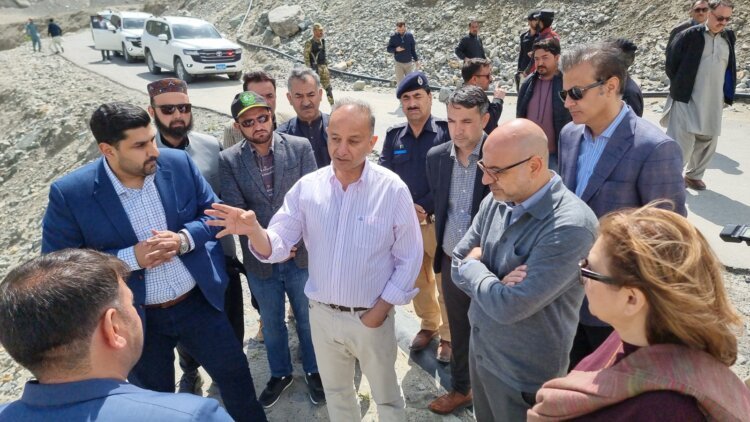Senator Musadik Malik Visits Shigar: Inspects GLOF-II Climate Resilience Projects and Engages with Local Communities
Shigar: Federal Minister for Climate Change, Senator Musadik Malik, conducted an extensive visit to District Shigar, accompanied by a high-level delegation from the United Nations Development Programme (UNDP) and the Ministry of Climate Change. The visit was aimed at reviewing the ongoing initiatives under the GLOF-II (Glacial Lake Outburst Flood) project, which seeks to mitigate the risks posed by climate change-induced glacial melting in the region.
During the visit, the minister inspected key installations in Shigar Valley, including early warning systems, protective embankments, and other infrastructure developed to safeguard communities vulnerable to glacial lake outburst floods. These measures are part of a broader strategy to enhance the region’s climate resilience amid the growing threat of environmental degradation in the Himalayan belt.
The delegation received detailed briefings from senior local officials, including Commissioner Baltistan Kamal Khan, Deputy Commissioner Shigar Waliullah Falahi, Director General of the Gilgit-Baltistan Disaster Management Authority (GBDMA) Zakir Hussain, and GLOF-II’s Provincial Coordinator Rasheed Uddin. The officials outlined the scope of the projects, their implementation status, and the challenges faced in managing the environmental risks associated with glacier retreat and lake bursts.
Senator Malik expressed concern over the increasing frequency and intensity of glacial outburst events in the northern areas, emphasizing the urgent need for proactive climate adaptation measures. He interacted with local residents to hear firsthand accounts of the difficulties faced due to shifting weather patterns, reduced agricultural productivity, and damage to homes and infrastructure.
“The impact of climate change on communities living in the mountains is real and devastating,” said Senator Malik. “We are committed to working with local authorities, international partners, and the people themselves to ensure that protective systems are in place and livelihoods are secured.”
He directed the Deputy Commissioner Shigar and Commissioner Baltistan to submit a comprehensive report outlining the environmental threats, damage assessments, and recommendations for future climate adaptation strategies in the region.
The visit highlighted the federal government’s continued focus on sustainable development and disaster preparedness in vulnerable regions like Gilgit-Baltistan. It also underscored the importance of collaboration between international organizations like UNDP and national institutions in tackling the complex challenges posed by climate change.



